云南省红河州弥勒县庆来学校七年级英语下册 Unit 9 How was your weekend学案
- 格式:doc
- 大小:159.50 KB
- 文档页数:4
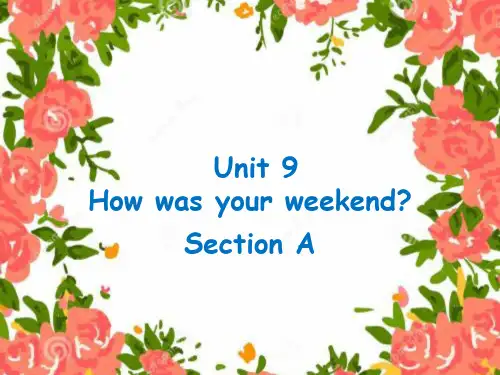
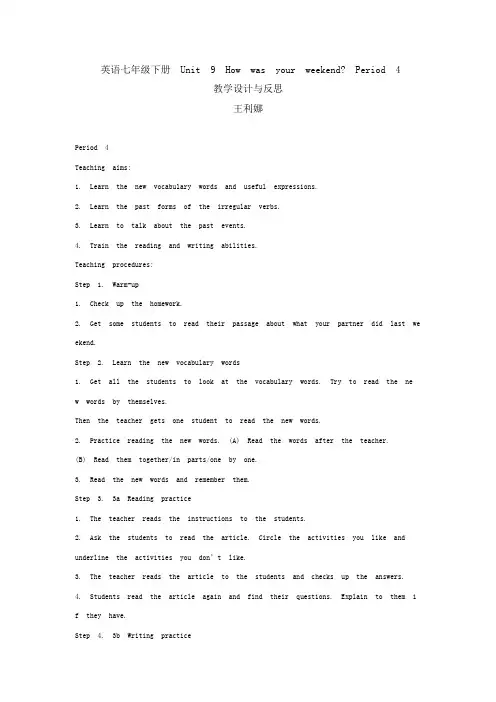
英语七年级下册Unit 9 How was your weekend? Period 4教学设计与反思王利娜Period 4Teaching aims:1. Learn the new vocabulary words and useful expressions.2. Learn the past forms of the irregular verbs.3. Learn to talk about the past events.4. Train the reading and writing abilities.Teaching procedures:Step 1. Warm-up1. Check up the homework.2. Get some students to read their passage about what your partner did last we ekend.Step 2. Learn the new vocabulary words1. Get all the students to look at the vocabulary words. Try to read the ne w words by themselves.Then the teacher gets one student to read the new words.2. Practice reading the new words. (A) Read the words after the teacher.(B) Read them together/in parts/one by one.3. Read the new words and remember them.Step 3. 3a Reading practice1. The teacher reads the instructions to the students.2. Ask the students to read the article. Circle the activities you like and underline the activities you don’t like.3. The teacher reads the article to the students and checks up the answers.4. Students read the article again and find their questions. Explain to them if they have.Step 4. 3b Writing practice1. Get the students to look at the pictures first. Then read the passage and try to fill in the blanksaccording to the pictures. Attentions to use the past tense.2. Get one student to read the passage and check up the answers.3. Students read the article again and find their questions. Explain to them if they have.Step 5. 3cWriting practice1.The teacher explains the instructions to the students.2. Get the students to write their own passages. Get help from activity 3b.3. Then correct your ads with your partner. The teacher can help them if the y have some questions.Get a few students to read their passage to the class.Step 6.GameActivity 41.The teacher explains the instructions to the students.2. Have students work in groups of four. Ask one student to write the activities he did last weekend. Then talk to the others about his weekend activities. And the others try to guess who he is.3. Have students to work in groups. Take turns to talk about the weekend activities and guess who he/she is.4. Have some groups of students present their conversations in class.Step 7. Review the words Self-check 1&21. Students read the words in the box and check all the words they know. They can circle the words they don’t know. Then ask them.2. Make their Chinese meanings clear.Then ask and answer the Chinese meanings in pairs or in groups.3.Ask each student to write five new words on their notebooks.Then share them with the others in groups.Step 8.Self-check 3 Reading and writing practice1. The teacher explains the instructions to the students. Tell the students wha t to do.2. Students read the passage about “Old Henry”.And find his problems.3. Tell students that they have to image that they went and helped Old Henry last weekend. Thinkabout the activities they could help him. They can get some help from the sugg estion box.4. Students write their own answers. After finishing, ask some students to read their passages to theclass.Step 9.Summary1. Summarize the new words and the useful expression2. The past forms of the irregular verbs.3. Talk about the past events.Step 10.Homework1. Remember the words and expressions.2. Write a passage about the activities your family members课后教学反思:运用直观教具为了进一步激发学生学习兴趣。
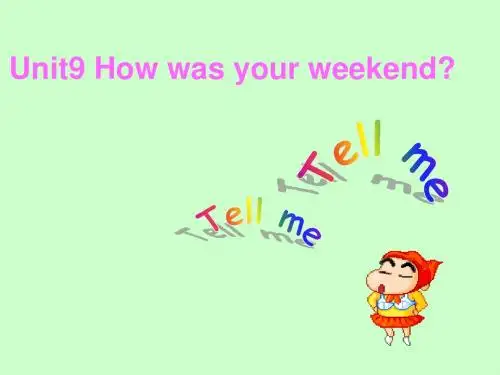
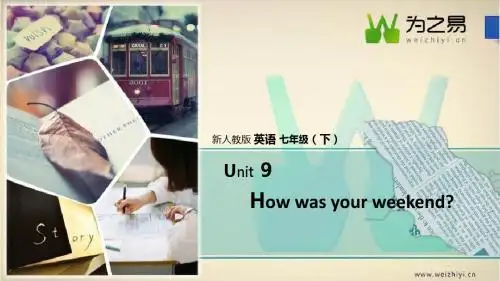
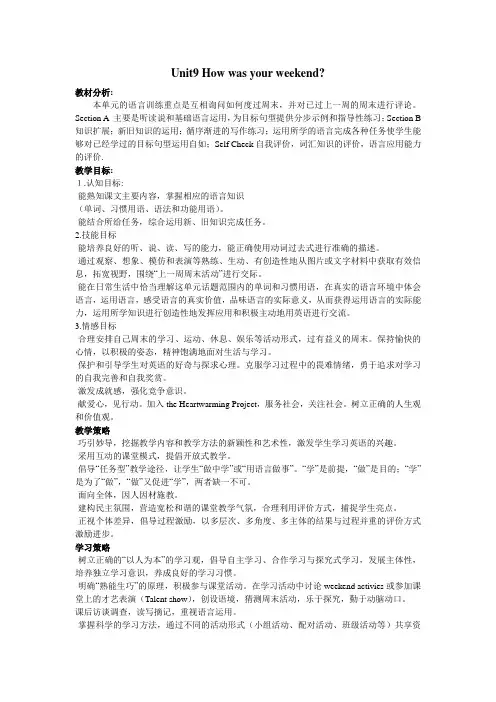
Unit9 How was your weekend?教材分析:本单元的语言训练重点是互相询问如何度过周末,并对已过上一周的周末进行评论。
Section A 主要是听读说和基础语言运用,为目标句型提供分步示例和指导性练习;Section B 知识扩展;新旧知识的运用;循序渐进的写作练习;运用所学的语言完成各种任务使学生能够对已经学过的目标句型运用自如;Self Check自我评价,词汇知识的评价,语言应用能力的评价.教学目标:1.认知目标:·能熟知课文主要内容,掌握相应的语言知识(单词、习惯用语、语法和功能用语)。
·能结合所给任务,综合运用新、旧知识完成任务。
2.技能目标·能培养良好的听、说、读、写的能力,能正确使用动词过去式进行准确的描述。
·通过观察、想象、模仿和表演等熟练、生动、有创造性地从图片或文字材料中获取有效信息,拓宽视野,围绕“上一周周末活动”进行交际。
·能在日常生活中恰当理解这单元话题范围内的单词和习惯用语,在真实的语言环境中体会语言,运用语言,感受语言的真实价值,品味语言的实际意义,从而获得运用语言的实际能力,运用所学知识进行创造性地发挥应用和积极主动地用英语进行交流。
3.情感目标·合理安排自己周末的学习、运动、休息、娱乐等活动形式,过有益义的周末。
保持愉快的心情,以积极的姿态,精神饱满地面对生活与学习。
·保护和引导学生对英语的好奇与探求心理。
克服学习过程中的畏难情绪,勇于追求对学习的自我完善和自我奖赏。
·激发成就感,强化竞争意识。
·献爱心,见行动。
加入the Heartwarming Project,服务社会,关注社会。
树立正确的人生观和价值观。
教学策略·巧引妙导,挖掘教学内容和教学方法的新颖性和艺术性,激发学生学习英语的兴趣。
·采用互动的课堂模式,提倡开放式教学。
·倡导“任务型”教学途径,让学生“做中学”或“用语言做事”。
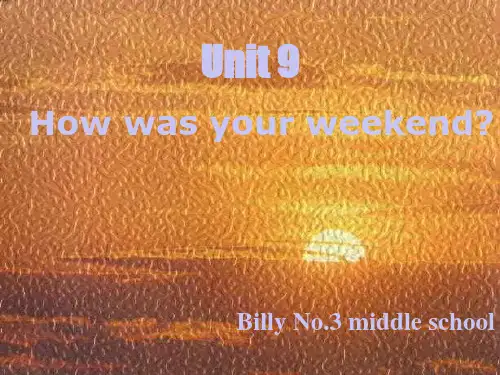
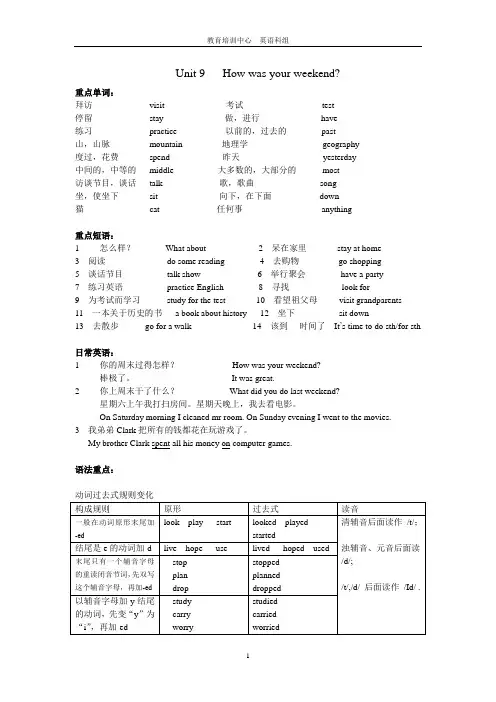
Unit 9 How was your weekend?重点单词:拜访visit 考试test停留stay 做,进行have练习practice 以前的,过去的past山,山脉mountain 地理学geography度过,花费spend 昨天yesterday中间的,中等的middle 大多数的,大部分的most访谈节目,谈话talk 歌,歌曲song坐,使坐下sit 向下,在下面down猫cat 任何事anything重点短语:1 ----怎么样?What about2 呆在家里stay at home3 阅读do some reading4 去购物go shopping5 谈话节目talk show6 举行聚会have a party7 练习英语practice English 8 寻找look for9 为考试而学习study for the test 10 看望祖父母visit grandparents11 一本关于历史的书 a book about history 12 坐下sit down13 去散步go for a walk 14 该到----时间了It’s time to do sth/for sth日常英语:1 ----你的周末过得怎样?-----How was your weekend?----棒极了。
---- It was great.2 ----你上周末干了什么?----What did you do last weekend?----星期六上午我打扫房间。
星期天晚上,我去看电影。
----On Saturday morning I cleaned mr room. On Sunday evening I went to the movies.3 我弟弟Clark把所有的钱都花在玩游戏了。
My brother Clark spent all his money on computer games.语法重点:动词过去式规则变化常见的不规则动词有:am/is----was are-----were become----became begin---began bring----brought buy----bought catch----caught come----came do----did eat-----ate feel----felt find----found get------got give-----gave go------went grow----grew have----had hear---heard know----knew make----made put----put run----run say-----said see----saw sit-----sat stand----stood take-----took teach-----taught tell----told write----wrote重要考点:1 play basketball, play tennis, play volleyball, play ping-pong, play baseball球类名词前不加冠词,且名词必须用单数形式。
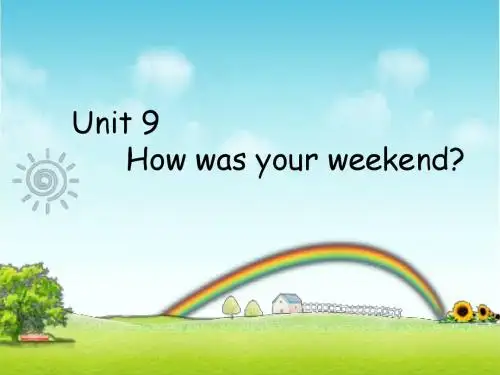
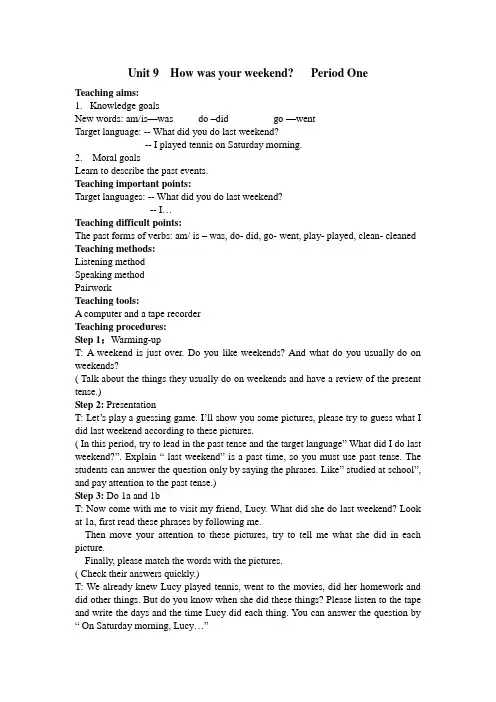
Unit 9 How was your weekend? Period OneTeaching aims:1.Knowledge goalsNew words: am/is—was do –did go —wentTarget language: -- What did you do last weekend?-- I played tennis on Saturday morning.2. Moral goalsLearn to describe the past events.Teaching important points:Target languages: -- What did you do last weekend?-- I…Teaching difficult points:The past forms of verbs: am/ is – was, do- did, go- went, play- played, clean- cleaned Teaching methods:Listening methodSpeaking methodPairworkTeaching tools:A computer and a tape recorderTeaching procedures:Step 1:Warming-upT: A weekend is just over. Do you like weekends? And what do you usually do on weekends?( Talk about the things they usually do on weekends and have a review of the present tense.)Step 2: PresentationT: Let’s play a guessing game. I’ll show you some pictures, please try to guess what I did last weekend according to these pictures.( In this period, try to lead in the past tense and the target language” What did I do last weekend?”. Explain “ last weekend” is a past time, so you must use past tense. The students can answer the question only by saying the phrases. Like” studied at school”, and pay attention to the past tense.)Step 3: Do 1a and 1bT: Now come with me to visit my friend, Lucy. What did she do last weekend? Look at 1a, first read these phrases by following me.Then move your attention to these pictures, try to tell me what she did in each picture.Finally, please match the words with the pictures.( Check their answers quickly.)T: We already knew Lucy played tennis, went to the movies, did her homework and did other things. But do you know when she did these things? Please listen to the tape and write the days and the time Lucy did each thing. You can answer the question by “ On Saturday morning, Lucy…”Step 4: Play a guessing gameT: Do you like games? I’ll ask a student to come in front of you, he’ll use his body language to act out some phrases used to describe activities, you try to guess what she/ he did according to his/ her performance.( This game used to practice the target language and let students learn to use the verbs in the past tense.)Step 5: Make a summary of the changing rulesT: Please pay attention to the verbs on the paper, they are all in the past tense, I want you to classify them according to their changing rules. Then tell us how to change a verb into its past tense. Make a summary of their changing rules.Step 6: Make a surveyUseful sentences:What did you do last weekend?When did you do it?Step 7: Homework1. Change the following words into past tensego have visit practice try planuse wash play study do are2. Ask about your parents’activities on last weekend, then do a report next class.课后反思:1.本课的重点是教会学生如何询问他人做过事情“What did you do lastweekend?”, 在本课件的开头,让学生通过图片猜上周末教师做过些什么的活动中,没有将这个语言点在课件上突出。
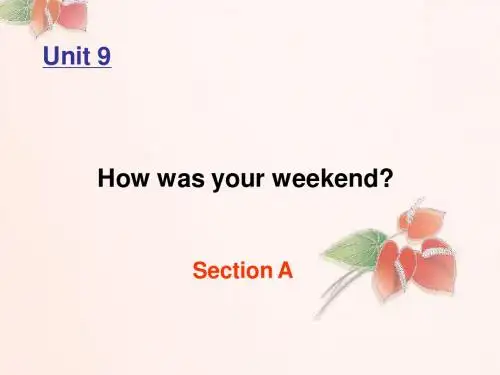

新目标英语七年级下册第九单元Unit9:Howwasyourweekend?(英语教案)新目标英语七年级下册第九单元Unit 9: How was your weekend?(英语教案)新目标英语七年级下册第九单元Unit 9: How was your weekend? Language goal In this unit, students learn to talk about recent past events. New language What did you do over the weekend? I cleaned my room. What did she do over the weekend? She did her homework. What did he do over the weekend? He went to the movies. What did they do over the weekend? They played tennis. Section A Additional materials to bring to class: wall calendar newspaper and magazine pictures for Follow-up activity 1 blank cards and markers for Follow-up activity 2 Point to the previous Saturday and Sunday on a wall calendar and say, Saturday and Sunday are the weekend. This is last weekend. Then tell some things you did last weekend such as,/ cleaned my house over the weekend. Use quick sketches (in the board along with gestures to demonstrate the meaning of each activity, Ask students, What did you do over the weekend9 Accept one-word answers and rephrase these answers in complete sentences. For example, if you ask, What did you do over the weekend? and a student says. The beach, rephrase it by saying, Oh, you went to the beach over the weekend. Ask several different students and help these students say complete answers. 1 a This activity introduces the key vocabulary. Focus attention on the picture. Ask students to tell what they see. Name each activity and ask students to repeat:went to the movies, played soccer, went to the beach,did homework, played tennis and cleaned my room. Point out thenumbered list of activities. Say each one again and ask students to repeat. Then ask students to match each activity with one of the pictures. Say, Write the letter of each activity next to the words. Point out the sample answer. Check the answers.1 b This activity gives students practice in understanding the target language in spoken conversation. Point to the activities in the picture in activity la.Ask students to tell what the person did in each picture.For example, She played tennis, or Lucy played tennis.Play the recording the first time. Students only listen. Play the recording a second time. This time say. Listen to the recording and write the days and times Lucy did each thing under the pictures. Point out the sample answer under the picture of Lucy playing tennis; on Saturday morning. Correct the answers. 1 c This activity provides guided oral practice using the target language. Point to the example conversation. Ask two students to read the dialogue to the class. Say, Now work with a partner. Student A, pretend to be Lucy. Student B, ask questions about what Lucy did on different days and times over the weekend.Talk about the activities in the picture. Students work in pairs. As they talk, move around the room monitoring their work. Offer language or pronunciation support as needed, 2a This activity gives students practice in understanding the key vocabulary in spoken conversation. Point to the five sentences and ask a student to read these sentences to the class. Say, You will hear t recording of a conversation. The people will talk about some of the activities and people, but they will not talk about others. Please underline the words you hear on the recording. Play the recording the first time. Students only listen. Play the recording a second time. This time, ask students to underline each word that is said on the tape. Point out the sample answer, grandmother. Correct theanswers. 2b This activity provides listening practice using the target language. Call attention to the pictures of Carol, Ben, and Emma and ask students to identify each person by name. Say, Now I will play the recording again. Listen to the students talking about what they aid over the weekend. Write C for Carol, B for Ben or E for Emma next to each statement in activity 2a. The first one has been done for you. Play the recording the first time. Students only listen. Point out the sample answer, S, in statement 1. Say,Sonia visited her grandmother. Play the recording again. Ask students to write a letter in front of each statement to show what each person did. Check the answers. 2c This activity provides guided oral and writing practice using the target language. Call attention to the dialogue and the list of activities in the box. Explain that students have to complete the dialogue using the activities words in the box. Students do the activity in pairs. When they have filled in the blanks, they practice the conversation. Have several pairs perform their conversations for the rest of the class. 3a This activity provides reading practice using the target language. Point to the three scenes in the picture. Ask students to describe what the person in each scene did. (Picture 1 shows: She went to the beach. Picture 2 shows: He did his homework and watched TV Picture 3 shows: She cleaned her room and studied for the math test.) After that, read the three dialogues with a student.The second part of each dialogue is incomplete. Say, The rest of the sentences are listed above the picture. Read them to the class or have a student read them. Say, Write the correct number on the blank lines in the speech bubbles to complete the conversations. Correct the answers. 3b This activity provides guided oral practice using the target language. Call attention to the example in speech bubbles. Ask a pair of students to readthe dialogue to the class. Say, Now practice asking and answering questions like this about what the people in the pictures did over the weekend. Practice in pairs. Use the dialogue as an example. Help students find partners. Then say, First read the dialogue together. Both students read both parts. Then make your own dialogues like that one. Tell what the people in activity 3a did over the weekend. Here is a sample dialogue: A: How was Sarahs weekend? B: It wasnt very good. She cleaned her room and studied for the math test. Ask pairs of students to present their dialogues to the class. 4 This activity provides oral practice using die target language. Play a model round of the game. Draw simple pictures of two things you did over the weekend. For example, a picture of a TV, and a picture of a tennis racket. Point to the picture of the Ty and ask a student to make a sentence about what you did (you watched TV). Do the same with the picture of the tennis racket and another student (you played tennis). Write the two sentences on the board and underline the -ed in watched and played and remind students to use the past tense. Now ask students to priictice the activity in groups of four. Each students draws two diings she or he might have done over the weekend on a piece of paper. The students then take turns to make sentences about each others pictures in past tense. Walk around the class offering assistance where necessary. Ask a student to draw two pictures about his or her last weekend on the bonrd. Class members guess the correct past tense sentences. Then write wh- words on the board (who, what, where, when, why, how) and encourage students to ask follow-up questions, for example. Who did you play tennis with9 Section B New language I played the guitar I studied geography. I went to the library. 1 a This activity introduces more key vocabulary. Call attention to the pictures. Askstudents to point to and use the past tense to describe as many of the activities as possible. Point to and describe any activities they cant describe. For example, I played the guitar. Then point to the numbered activities described in the list. Name the activities and ask students to repeat each one, After that, ask students to match each numbered phrase with a picture by writing the letter of each picture in the blank in front of the correct phrase.As students work, move around the room answering questions as needed. Check the answers 1 b This activity provides reading practice using the target language. Draw pictures of the happy face and unhappy face文档内容到此结束,欢迎大家下载、修改、丰富并分享给更多有需要的人。
七年级英语下册 Unit 9 How was your weekend学案(无答案)【学习概要】
1.学会谈论周末所从事的活动.
2.学会谈论不久前发生的事情――学会一般过去时的用法.
【重难点解析】
Step1 导入新单词
Ⅰ短语
1. play + the + 乐器Eg: play the guitar/ piano 弹(奏)----
2. play + 球类运动 Eg: play tennis/ soccer 达(踢)----
3. go (went) to the beach/ movies/ mountains/ pool/ library 去海滩/ 电影院/ 山林/ 游泳池/ 图书馆
4. visit (visited) sb = go to see sb 拜访某人
5. study (studied) for 为----而学习 Eg: I studied for the science test.
6. stay (stayed) at home 待在家 Eg: I stayed at home yesterday.
7. do (did) some reading/ shopping 阅读/ 购物
8. have (had) a party 开晚会
9. practice (practiced) doing sth 练习做某事(类似用法:like, enjoy, have fun)
10. clean (cleaned) the room 打扫房间
11. spend (spent) sometime / money (in) doing sth花费时间/金钱做某事
12. spend (spent) som etime / money on sth 在某事上花费时间/金钱做某事
13. 介词(prep): ① on + 具体的星期几/ 日期Eg: on Sundays/ July 7
② in + 月/年/季节/世纪Eg: in July/ 2006/ summer/ 21century
③ at + 具体钟点Eg: at 7:00
14. go for a walk 散步
15. It’s time to do sth = It’s time for sth 该到做----的时间了
Eg: It’s time to go for a walk.= It’s time for walk.
16. ① look (looked) for 寻找(的动作)② find (found)寻找(的结果)
Eg: I looked for everywhere b ut I couldn’t find my key.
Step2 目标交际用语及句型
What did you do last weekend? I played soccer. / We went to the beach.
What did she/ he do last weekend? She did her homework. / He went to the movies. What did they do last weekend? They played tennis.
⑶一般过去时的时间状语
①yesterday ②the day before yesterday ③at that time
④ ----ago 构成的短语 two days/ one hour/ three years ago
⑤ last构成的短语 last week/ month/ year
⑥ in + 过去的年代in 1990/2002 ⑦ just now
⑷以Be动词作谓语的一般过去时构成
① be动词的变化is/ am --- was are ---- were
② was/ were 和人称的搭配
was: I / he/ she/ it/ 单数第三人称/ 可数名词单数/不可数名词
were: we/ you/ they/ 复数人称/ 可数名词复数
③肯定句:主语+ was/were+其他+时状.
④否定句:主语+was/were +not+其他+时状.
⑤一般疑问句:Was/Were+主语+ 其他+时状?
肯定回答:Yes,主语 +was/were. 否定回答:No, 主语+wasn’t/ weren’t.
⑸以实义动词作谓语的一般过去时(助动词只有did)
①肯定句:主语+V.(过去式)+其他+时状.
②否定句:主语+didn’t +V. (原形) +其他+时状.
③一般疑问句:Did +主语+V(原形)+ 其他+时状?
肯定回答:Yes,主语 +did. 否定回答:No, 主语+didn’t.
[实义动词一般过去时用法歌诀:动词一般过去时,表示过去发生事。
句中谓语用过去式,过去时间作标记。
否定句,很简单,主语之后didn’t 添。
疑问构成也有法,主语前面did加。
还有一点不能忘,后面的动词要还原。
]
④动词过去式的规则变化:
changed
⑥动词过去式的不规则变化:笔记unit8 I’d like some noodles.
⑦动词过去式的读音:清后清,浊后浊,/ t/ , /d/ 后面读/ id/
Step3 听力训练及材料复述
Step4 短文重难点解析
1.解析watch sb. do sth.结构
此结构的意思为“看着某人做某事”,watch为观看,看着之意,是感觉动词,一般在句中作感觉动词宾语补足语的不定式结构,要省去to.
e.g.:They are looking for their math books.
She looked for his brother last night. At last, she found him. 【模拟导训】
用本单元所学的时态,描述昨天发生的事情。